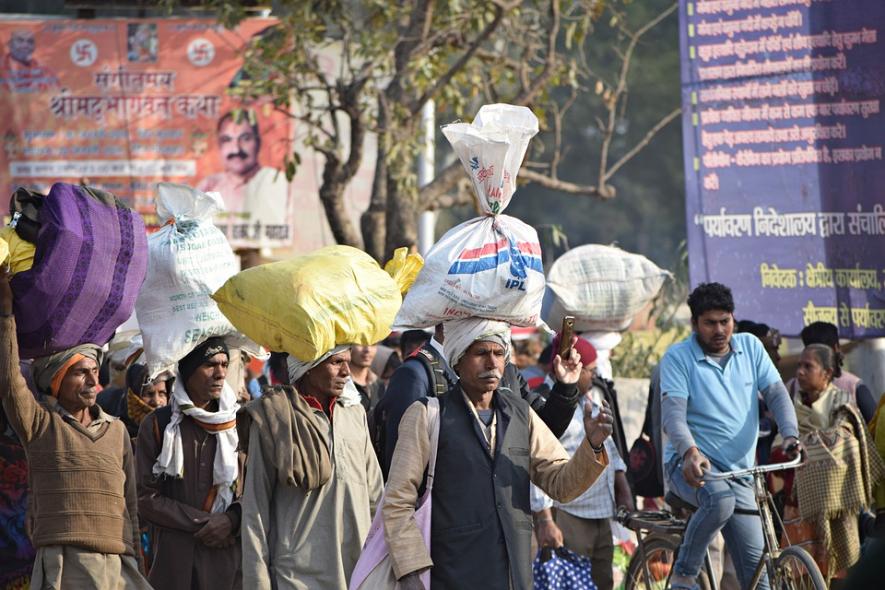Covid-19: Hasty Lockdowns, Economic Crises and Popular PMs

The country awoke to yet another collision on the highways not long ago. Two trucks, both carrying migrants, crashed in Uttar Pradesh’s Auraiya district killing at least 26 and injuring 36 people. The passengers were fleeing joblessness and hunger in Rajasthan and Haryana and were desperate to reach their homes in Uttar Pradesh, Bihar, Jharkhand and West Bengal.
Ever since the hasty and unplanned lockdown was announced on 24 March such accidents have become commonplace. In the first week of May, 15 workers were crushed by a goods train as they fell asleep on the tracks exhausted, between Jalna and Aurangabad in Maharashtra.
Hasty and unplanned lockdown
In March, the health and information and broadcasting ministries was issuing advertisements and publicity material warning against the spread of the Novel Coronavirus but they still maintained that things are under control.
Even though public health experts and epidemiologists were issuing warnings and state governments had started proceeding towards lockdowns, starting with closing schools and colleges, and urging people to avoid crowds, the Centre finally woke up only when drastic measures needed to be taken to control the pandemic. Hence it acted in haste and did no proper planning.
After the one-day janata curfew, followed by the taali bajao campaign of 21 March, the first phase of a near-total lockdown suddenly began, with only four hours notice, from midnight of 25 March. While common-sense dictates that a lockdown be put in place in stages, as many states were doing, so that people get at least a few days to buy basic necessities, and so that people who wish to return to their families elsewhere can do so too, India did the opposite.
Not just that. India’s nationwide lockdown shut down all “non-essentials”, including a near-total ban on all transport, except that deemed “most essential”, which also required passes from the local administration or police. By blocking inter-state transport by bus and train the Centre brought the whole country to a standstill.
There was chaos from day one of the lockdown, which is the world’s harshest, with a singular objective of “flattening the curve”. Vinod Paul, a member of NITI Aayog, even said that India could reach zero new cases of Covid-19 infections by 16 May if the lockdown rules are followed. Paul is also chairperson of the national task force on the pandemic.
With the total number of positive cases reaching 1,37,902 by 24 May and over 4,013 deaths, the lockdown seems to have, at best, slightly slowed the spread and has otherwise failed.
The plight of migrants
The government should have foreseen the number of people who might be severely affected, such as daily-wage labourers, domestic workers and rickshaw pullers, and arranged for accommodation and food for them. Instead, it did no advance planning and little thereafter, leaving millions—mainly from central and eastern states who lost their jobs—to fend for themselves.
While for the upper middle class the lockdown, the stress of being forced to stay indoors, particularly for those who are alone, may be high, but that is nothing compared to what the poor are going through. Daily wage earners and contractual workers are now trapped in a cycle of poverty, hunger, joblessness and desperation.
The government failed to transfer any cash to make any dent in their conditions and the prime minister, instead, urged people to be benevolent and help the needy. Some states claimed that they have arranged shelter and food for migrants, but these were never sufficient and those who were leading dignified lives, toiling in factories or as domestic help were forced to beg for food, money, or stand in long queues at community kitchens for hours.
Left without money for weeks, and hungry stomachs, these migrants decided to walk home or use whatever transport they can muster up to reach their native villages. The common refrain we hear is, “Even if I have to die of hunger or corona, I would prefer it be in my village, while I am with my family.”
Bereft of dignified life
Those rich and privileged, who have everyone around them with certain means, may not even realise the gravity of the situation, and hence may question the choice of the poor migrants undertaking their arduous journeys.
The little savings the poor had, they have exhausted and not everyone is comfortable with accepting donated rations when just weeks ago they had dignified jobs. This is why it is increasingly difficult for the police and administration to enforce the lockdown.
Some states have practically turned into police states, with men in khaki raising their baton against the marginalised while celebrating the birthdays of the rich and celebrities.
Will the pandemic dent PM Modi’s popularity?
The fourth phase of the national lockdown is well underway, but now many relaxations are in place as governments attempt to bring life back to normal and prepare the country to “live with the virus”. But visuals on social media and media reports of the desperate situation of the poor makes one wonder if this would dent the popularity of Prime Minister Narendra Modi. Will people hold him responsible for mishandling the pandemic and bringing untold economic hardships?
Going by few surveys, as also the general reaction on social media, one realises that those criticising his government are still largely those who may never have supported the saffron party. This creates the impression that the pandemic has not dented the image of the PM, at least among his supporters. Ironically, by his supporters he is still seen as the one trying to control the Covid-19 crisis, although it is the state governments, particularly those ruled by non-BJP parties, which shoulder the responsibility of all shortcomings, from lack of planning at the Centre, to inadequate health infrastructure and the hole in the exchequer.
And, though the majority of migrants walking on highways are from poorer Hindi belts (and eastern states of Bengal, Odisha, Assam), you hardly see the majority of the people from these states getting agitated.
But surely it is not just those who have ideological differences with the ruling dispensation who are suffering from the pandemic and the unplanned lockdown? It is a wider citizenry that is finding it difficult to repay bank loans, which faces salary cuts and job losses, and not just supporters of Opposition parties.
Is it that the BJP’s supporters feel compelled to bolster the Centre and BJP-led state governments as this is a time of crisis? Are they motivated by the desire to support a national cause? If this were really the case, then we would have seen similar support among them for non-BJP state government as well.
How is it that people in (or from) Bihar, Uttar Pradesh, Madhya Pradesh or Gujarat are more worried about the conditions of hospitals in West Bengal while every day the number of Covid-19 positive cases keeps rising in their own states?
The answer to these dilemmas will explain the popularity of Modi and how this pandemic or any other crisis would affect his popularity.
The senior journalist, Shams Ur Rehman Alavi tells me that when a political party comes to represent religion and faith, then people may suffer, but as long as they are alive they will not they go against their own faith. “Herein lies the BJP’s success,” he said.
More importantly, the Hindutva brigade, in cahoots with a section of the mainstream media, has also diverted attention to the perpetual villain, the Muslim, by singularly focussing on the Tablighi Jamaat episode for over a month.
Kolkata-based activist Hasnain Imam, told me that the branding of the Modi cult and myths surrounding his personality have been bombarded on people, particularly in the Hindi belt, to such an extent, that an alternative narrative to puncture it is needed—but that is yet to take shape.
The TV channels and vernacular press play a big role here. For example, even those suffering can be heard comparing Modi with the American president, who is struggling to cope with the viral pandemic in his country. There are many Indians who believe that by imposing the lockdown early, the PM only wanted to save lives. ‘What he can do when even the USA is sinking?’ Hasnain suggests another possible way of looking at the situation: the successful erosion of democratic values in the country. It is no longer normal to raise questions.
Accordingly, nobody is.
In electoral politics, optics matter and Modi has lost no opportunity even in this crisis to mobilise the masses who are already his supporters. As he gathers their accolades, it is the state governments who strive to control the virus—and they, along with some of his ministers may be at the receiving end if things keep slipping out of his hands.
The author is assistant professor of journalism at Aliah University, Kolkata. The views are personal.
Get the latest reports & analysis with people's perspective on Protests, movements & deep analytical videos, discussions of the current affairs in your Telegram app. Subscribe to NewsClick's Telegram channel & get Real-Time updates on stories, as they get published on our website.























